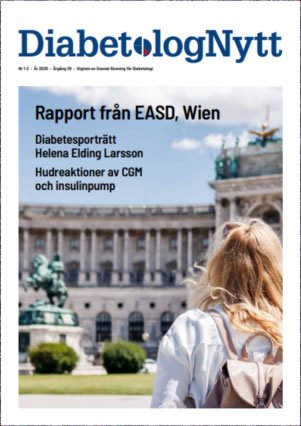In adults with two or more antibodies predicting the development of type 1 diabetes, treatment with daily oral insulin therapy did not prevent development of the disease, but a small subset experienced a 31-month delay in clinical diabetes development.
Close relatives of people with type 1 diabetes who had certain autoantibodies that put them at high risk of progression to clinical type 1 diabetes did not benefit from taking oral insulin vs placebo, according to a new trial. The participants were mostly children and adolescents, with a median age of 8. However, “surprisingly,” among a small subset of participants with the same autoantibodies against islet cells but with low insulin secretion, those who received insulin tablets were diagnosed with type 1 diabetes 2.5 years later than those who got placebo.
This was the largest trial ever performed using oral insulin and even though the results were not a homerun, a pre-specified secondary hypothesis was met and there were no significant adverse events. The results showed an incremental advance as it was able to delay type 1 diabetes for 2.5 years in a subset.
Dr. Carla J. Greenbaum, who presented the results, stated that people with close relatives with type 1 diabetes have a 15-fold increased risk of developing the disease themselves.
An earlier study had suggested that if such individuals also had high levels of micro insulin autoantibodies (mIAA), taking oral insulin might buy time until they were diagnosed with the same disease. Thus, the researchers aimed to determine if insulin tablets might delay or prevent type 1 diabetes in high-risk individuals with high levels of mIAA plus certain other islet autoantibodies (the primary outcome). They also aimed to gather information from individuals with different profiles of islet autoantibodies (secondary outcomes).
From 2007 to 2015, the researchers screened almost 140,000 individuals who had a close relative with type 1 diabetes at 87 sites in eight countries, and they enrolled 560 individuals. Participants were either 3 to 45 years old with a first-degree relative (child, parent, or sibling) with type 1 diabetes or 3 to 20 years old with a second-degree relative (uncle, aunt, niece, nephew, cousin, or grandparent) with type 1 diabetes.
The enrolled subjects had a median age of 8.25. They were in phase 1 of the continuum of type 1 diabetes disease progression. That is, they had normal blood glucose and two or more islet autoantibodies, including mIAA, islet-cell antibodies (ICA), glutamic acid decarboxylase (GAD) antibodies, or islet antigen-2 (IA-2) antibodies. The study subjects were then divided into four groups:
Primary stratum: 389 participants with mIAA and ICA or GAD plus IA-2 and high insulin secretion (above threshold).Secondary stratum 1: 55 patients with mIAA and ICA or GAD plus IA-2 and low insulin secretion.Secondary stratum 2: 114 patients with mIAA and GAD or IA-2 and high insulin secretion.Secondary stratum 3: Two patients with mIAA and GAD or IA-2, and low insulin secretion.
In each group, subjects were randomized to receive 7.5 mg/day of oral insulin or placebo. They had oral glucose-tolerance tests every 6 months to assess if they had developed type 1 diabetes. In the primary-stratum group, 8.8% of subjects treated with oral insulin vs 10.2% of subjects who received placebo developed diabetes each year, during an 8-year follow-up, which was not a significant difference (HR, 0.87; P = .42). Similarly, oral insulin did not have a significant effect on the development of type 1 diabetes in the combined secondary-strata 2 and 3 groups or in the overall study sample. However, in the secondary-stratum 1 group, 18.1% of those treated with oral insulin vs 34.1% of subjects who received placebo developed diabetes each year during follow-up, which was a significant 55% reduction (HR 0.45; 95% CI, 0.22–0.91; P = .01). This translated into a 2.5-year delay in the median time to type 1 diabetes with oral insulin in this subgroup.
It was emphasized that the results further support the understanding that not everyone develops type 1 diabetes in the same way and is an early step toward developing specific targeted therapies. Plus it clearly shows that more research is needed to explore why certain people may respond to oral insulin and others don’t.
Although the trial was the largest study ever done with oral insulin and the results were negative in the “main stratum” of studied patients, nonetheless this dramatic result in this subset of patients” is definitely something to follow up with in future research.
Practice Pearls:
• Over 8 years, over 140,000 individuals with a first- or second-degree relative with type 1 diabetes were screened and 560 were enrolled into the study. Subjects were randomized to 7.5mg or oral insulin or placebo.
• Oral insulin did not have a significant effect on the development of type 1 diabetes in the combined secondary-strata 2 and 3 groups or in the overall study sample.
• In the secondary-stratum 1 group, 18.1% of those treated with oral insulin vs 34.1% of subjects who received placebo developed diabetes each year during follow-up, which was a significant 55% reduction (HR 0.45; 95% CI, 0.22–0.91; P = .01), which translated into a 2.5-year delay in the median time to type 1 diabetes with oral insulin in this subgroup.
American Diabetes Association 2017 Scientific Sessions; June 12, 2016; San Diego, California. Type 1 Diabetes Immune Intervention Trials. Session 5-IT-SY07 TrialNet Oral Insulin for Prevention of Diabetes in Relatives at Risk for Type 1 Diabetes Mellitus
Nyhetsinfo
www red DiabetologNytt

